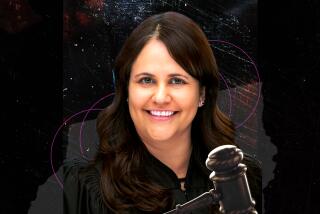Panel OKs nominee for chief justice
SAN FRANCISCO — Justice Tani Cantil-Sakauye moved one step closer Wednesday to becoming the first minority California chief justice, winning unanimous confirmation by a state commission.
The three-member Commission on Judicial Appointments heard nearly two hours of testimony before approving Gov. Arnold Schwarzenegger’s nominee to head the state’s $3.5-billion court system and the California Supreme Court.
A total of 12 witnesses, including a representative of a bar evaluations committee, testified in her favor, and a community activist and an attorney spoke out against her.
Members of the California Supreme Court sat in one front row during the hearing, and Cantil-Sakauye sat in another with her husband, a Sacramento police lieutenant, their two daughters, her mother and her in-laws.
Commissioner Joan Dempsey Klein, an appeals court justice from Los Angeles, noted after the testimony that women have had to struggle for a place in the legal world.
“Do you recognize the huge responsibility to yourself and your gender?” Klein asked Cantil-Sakauye.
Cantil-Sakauye replied that she was mindful of the pioneering work of women lawyers and judges.
“None of us got here alone,” she said.
If approved by voters on the November ballot, Cantil-Sakauye would be the court’s first Filipina and only the second female chief justice.
Cantil-Sakauye, 50, is a former prosecutor who worked on legal affairs and legislative matters for former Gov. George Deukmejian and moved up the ranks from Municipal Court judge to the state Court of Appeal in Sacramento.
She is a moderate Republican who presided over the marriage of a same-sex couple during the six months in 2008 when state law permitted gay marriage.
During Wednesday’s hearing, a prosecutor told the commission about trying a murder case before Cantil-Sakauye in Sacramento County Superior Court in 2002.
After sentencing the defendant to life in prison, Cantil-Sakauye walked down from the bench, held the hand of the crime victim’s mother and told her how sorry she was for her son’s death, according to Anne Marie Schubert, the prosecutor in the case and now Sacramento’s supervising deputy district attorney.
Michael Arkelian, who worked as a public defender for 28 years, testified that he did not always agree with Cantil-Sakauye’s decisions but described them as “extremely well reasoned” and made with an eye to justice.
Representatives of Filipino groups expressed pride in her selection. Melvin Avanzado, a board member of the Philippine American Bar Assn., noted that the state has only 10 judges of Filipino heritage even though 1.9 million Filipinos live in California.
“I am a proud Filipino,” said Eduardo Angeles, representing the Filipino American Service Group. “But I am even more proud as a Californian and an American.”
E.T. Snell, who described himself as “the clown community activist” because he said he usually shows up dressed as a clown, said that Cantil-Sakauye pursued “draconian criminal jurisprudence.”
Deputy Atty. Gen. Geoffrey L. Graybill, who said he was speaking as a private lawyer, said that the judge favored women over men in family court matters.
Cantil-Sakauye, the final speaker, called such testimony “false and misinformed and misguided.” She promised to “listen closely and analyze carefully” and follow the rule of law.
Later, at her first news conference as prospective chief justice, Cantil-Sakauye was asked to discuss California’s death penalty system, which Chief Justice Ronald M. George has called dysfunctional.
She said a backlog of death penalty appeals is straining the court system and noted that she had read a 2008 report by the Commission on the Fair Administration of Justice, which outlined problems and potential solutions in the administration of the death penalty.
During a Times interview last month, Cantil-Sakauye had been unaware of the report. “I am not the expert, but I would like to hear what the experts have to say,” she said.
--
More to Read
Sign up for Essential California
The most important California stories and recommendations in your inbox every morning.
You may occasionally receive promotional content from the Los Angeles Times.










